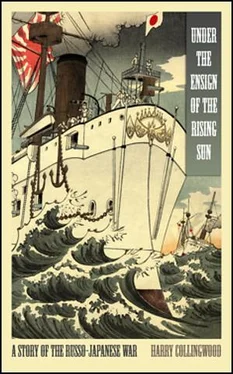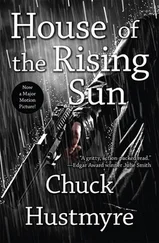Harry Collingwood - Under the Ensign of the Rising Sun
Здесь есть возможность читать онлайн «Harry Collingwood - Under the Ensign of the Rising Sun» весь текст электронной книги совершенно бесплатно (целиком полную версию без сокращений). В некоторых случаях можно слушать аудио, скачать через торрент в формате fb2 и присутствует краткое содержание. Год выпуска: 1916, Жанр: nonf_military, на английском языке. Описание произведения, (предисловие) а так же отзывы посетителей доступны на портале библиотеки ЛибКат.
- Название:Under the Ensign of the Rising Sun
- Автор:
- Жанр:
- Год:1916
- ISBN:нет данных
- Рейтинг книги:4 / 5. Голосов: 1
-
Избранное:Добавить в избранное
- Отзывы:
-
Ваша оценка:
- 80
- 1
- 2
- 3
- 4
- 5
Under the Ensign of the Rising Sun: краткое содержание, описание и аннотация
Предлагаем к чтению аннотацию, описание, краткое содержание или предисловие (зависит от того, что написал сам автор книги «Under the Ensign of the Rising Sun»). Если вы не нашли необходимую информацию о книге — напишите в комментариях, мы постараемся отыскать её.
Under the Ensign of the Rising Sun — читать онлайн бесплатно полную книгу (весь текст) целиком
Ниже представлен текст книги, разбитый по страницам. Система сохранения места последней прочитанной страницы, позволяет с удобством читать онлайн бесплатно книгу «Under the Ensign of the Rising Sun», без необходимости каждый раз заново искать на чём Вы остановились. Поставьте закладку, и сможете в любой момент перейти на страницу, на которой закончили чтение.
Интервал:
Закладка:
A week later our cruisers and destroyers effected a coup which, there is every reason to believe, must have materially hastened the fall of the fortress. This consisted in the capture, off Round Island, of a great fleet of Chinese junks, bound from Wei-hai-wei to Port Arthur, conveying to the beleaguered city vast quantities of food, clothing, ammunition, explosives, and supplies of every imaginable description. The junks were taken into Dalny, where their cargoes were declared to be contraband of war, and confiscated by the Japanese.
These several successes, comparatively unimportant though they were, coupled with the practical destruction of the Port Arthur and Vladivostock fleets, put new heart into the Japanese for a time; but with the arrival and passage of the month of September, during which no appreciable progress was made in the operations before Port Arthur, even the unexampled patience and superb stoicism thus far displayed by the Japanese as a people showed signs of the wear and tear to which they had so long been subjected, and murmurings at General Nogi’s apparent non-success began to make themselves heard. The casualty lists seemed to grow ever longer with the passage of the days, without any visible result, except that Nogi contrived to retain possession of the few unimportant positions which he had gained, and a black cloud of pessimism seemed to be settling down upon the Island Empire.
Meanwhile, however, in its silent, secret, undemonstrative way, the Japanese army had been making preparations of an important character, among which were included the construction of concrete emplacements for eighteen 11-inch howitzers, from which great things were expected. They fired a 500-pound projectile charged with high explosive, and had a range which enabled them to command the entire area of the fortress, including the harbour.
On the 1st October the first six of these howitzers opened fire, in the presence of General Baron Kodama, who had crossed to Port Arthur from Japan to administer, perhaps, a fillip to the officers and the army generally. North Kikwan fort was the first recipient of the new guns’ delicate attentions, one hundred shells being poured into it. Huge clouds of dust and smoke at once arose from the fort; but it was enormously strong, and no very important results were apparent. On the following day and for a few days afterwards the howitzers lobbed shells upon the fleet, and the Pobieda, Poltava, Retvisan , and Peresviet were all struck, and their crews driven out of them, after which they were moved to the East harbour, where they were hidden from the sight of our gunners by the intervening high ground.
Meanwhile the Japanese engineers were resolutely and industriously pushing their saps ever closer up to the Russian forts, in the progress of which task the most furious and sanguinary hand-to-hand fighting with bayonet and bomb was of daily, nay hourly, occurrence. The slaughter was appalling, few of the combatants on either side surviving such encounters.
Yet, although the advantages were all on the side of the defenders, the patience and heroism of the Japanese steadily told, and on 4th October they attacked a work at Yenchang, near Takhe Bay, and destroyed the two machine-guns with which it was armed. This success was followed up by the capture, on 16th October, of an immensely strong Russian position on Hashimakayana Hill. Ten days later, the Japanese troops stormed and took, after hours of sanguinary fighting, the two important positions of Erhlung and Sungshushan, on the northern and north-western salients of the old Chinese Wall; and these successes were considered to have cleared the ground for the general assault which had been ordered from headquarters in Japan.
For four days—27th, 28th, 29th, and 30th October—the Russian works were subjected to such a terrific bombardment as, up to then, mortal eyes had certainly never beheld. It reached its height about eight o’clock on the morning of the 30th, and continued until about one o’clock in the afternoon, during which the din was terrific and indescribable. Shell and shrapnel fell upon the Russian works at the rate of one hundred per minute, the forts resembled volcanoes in eruption, from the continuous explosions of the shells which fell upon them, and the entire landscape became veiled in a thick haze of smoke. At one o’clock the preparation was thought to be complete; and ten minutes later the great assault began—to end in complete and disastrous failure! The Russian forts, supposed to have been silenced by those four days of terrific bombardment, were as formidable as ever; and as the stormers dashed forward they were met by so furious a rifle and artillery fire that they were literally annihilated. The second grand assault upon Port Arthur had failed, as completely and tragically as the first!
To have incurred such tremendous losses for such insignificant results was a terribly depressing experience for Japan; but the benumbing effect of the blow began to pass away when, in the first week of November, the news arrived of General Oku’s splendid success upon the Shaho; and with renewed hope, and that indomitable patience and courage which is so marked a feature of Japanese character, the troops before Port Arthur set to work to repair their disasters.
Their first success was achieved in the middle of the month of November, when they gained possession of the little village of Kaokiatun, thus securing the command of Pigeon Bay. This success was followed, on the 23rd of the month, by an attempt on the part of the Japanese to capture the Russian trench on East Kikwan Hill. The attempt resulted in failure, with a loss of some three hundred slain, to say nothing of wounded. This was followed, on the 26th, by an attack upon Q Fort, North Kikwan, Erhlung, and Sungshushan. This too resulted in failure for the Japanese, with awful slaughter; the failure in this case, however, being tempered by the capture of the trench on East Kikwan Hill. This capture was of very great importance to the Japanese, from the fact that it commanded the approach to the fort on the summit of the hill; and the Russians, recognising this fact, fought madly to regain possession of the trench, finally succeeding toward midnight. The fighting on this occasion was most disastrous for the Japanese, their wounded alone totalling over 6000, while it was estimated that in dead their losses must have exceeded 10,000!
The result of all this sanguinary fighting was to convince the Japanese Staff, at last, that the defences on the eastern slope were impregnable to assault, and must be captured by other means. They accordingly next turned their attention to 203 Metre Hill, which was the key to the eastern defences of Port Arthur, and determined to take it by assault.
This was a particularly tough proposition, and after the tremendous losses which Nogi’s army had already suffered in its disastrous assaults upon the eastern defences, the Staff might well have been excused had it hesitated to undertake such a herculean task. For the position was so immensely strong that the Russians regarded it as impregnable. The merely natural difficulties of the adventure were great, for, as its name indicates, it was a lofty hill, with steep, almost precipitous slopes, to scale which, even unopposed, was no light task. But when to this difficulty was added the further one that the hill had two summits, each crowned by very strong earthworks constructed of sand-bags, timber and steel rails, connected by tunnels with bomb-proof works on the rear slope, and that it was further protected by two lines of trenches, themselves protected by strong barbed wire entanglements, and that the works on the summit mounted several machine-guns and some heavier pieces of artillery, the reader may be able to form some slight idea of the obstacles which the Japanese undertook to surmount, as well as the indomitable courage which possessed them to make the attempt.
Читать дальшеИнтервал:
Закладка:
Похожие книги на «Under the Ensign of the Rising Sun»
Представляем Вашему вниманию похожие книги на «Under the Ensign of the Rising Sun» списком для выбора. Мы отобрали схожую по названию и смыслу литературу в надежде предоставить читателям больше вариантов отыскать новые, интересные, ещё непрочитанные произведения.
Обсуждение, отзывы о книге «Under the Ensign of the Rising Sun» и просто собственные мнения читателей. Оставьте ваши комментарии, напишите, что Вы думаете о произведении, его смысле или главных героях. Укажите что конкретно понравилось, а что нет, и почему Вы так считаете.












